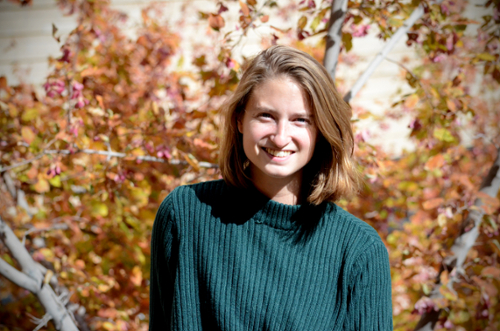
SER Graduate Student Ellen Polites Contributes to Carbon Capture, Utilization and Storage Research
Published October 23, 2020
By Christine Reed

In its mission to advance energy research and education, the School of Energy Resources (SER) helps fund graduate students all over campus. Under the expertise and guidance of dedicated SER faculty members in their home departments, the research conducted by graduate students compliments and enhances some of the most cutting-edge energy projects taking place in the state of Wyoming.
UW graduate student Ellen Polites is one such student. Though housed in the UW Department of Geology and Geophysics, the research Polites is working towards for her master’s thesis is part of the greater research endeavor spear-headed by the Center for Economic Geology Research (CEGR), the CarbonSAFE project.
Her graduate research involves working on the CarbonSAFE project where she is investigating cap rock integrity. Specifically, she is examining Mowry shale, which is a large cretaceous shale formation. This particular layer of rock is a critical piece of the project as it will be the ultimate barrier in keeping carbon dioxide (C02) from getting to the surface.
Under the supervision of Professor John Kaszuba in the geology department, Polites conducts experiments to see how the rocks react with C02 and fluid. By mixing Mowry and CO2 with formation brine from the Minnelusa formation, which is the main injection reservoir for carbon dioxide storage, Polites observes and examines the reactions that occur.
Originally from York, Penn., Polites attended Penn State University for her undergraduate degree in geosciences. Drawn to geology at an early age, the degree seemed like a natural fit since it offered a variety of career options but was also an important field where she could make an actual difference and impact on the nation’s energy future.
Polites came to Wyoming because of its unique geological landscape and for the progressive research projects conducted at the University. With the reputation of Wyoming scholars preceded it, Polites was especially drawn to the work that Professor Kaszuba was conducting in his labs with fluid-rock interactions.
Dr. Kaszuba has been pleased by the hard work and dedication that Polites has exhibited in her time at UW.
“Ellen is a thoughtful student with a great work ethic,” he says. “She has a bright future ahead of her.”
Her hard work was integral in helping land a prestigious internship with Pacific Northwest National Laboratory (PNNL) by way of the Mickey Leland Energy Fellowship Program during the summer of 2020. After completing a competitive application process, fellows are sent all over the country to different labs. At PNNL, Polites worked with a team that performs carbon sequestration in basalts. For her project, Polites was looking at and consolidating data for two-year post injection core samples from a pilot site where 1000 metric tons of C02 was injected.
Polites is also appreciative of the integration between the School of Energy Resources and the Department of Geology and Geophysics. The interdisciplinary collaboration has enhanced her educational experience and offered unique benefits that are not available elsewhere, particularly under the guidance of Research Scientist Erin Phillips and CEGR Director, Scott Quillinan.
“The first thing I did when I got to Laramie was meet with Erin and Scott and they really introduced me to SER and all it had to offer,” she comments. “I went to SER talks on Fridays, went on tours with lab groups, and participated in Carbon Day in Cheyenne. I am extremely proud to be representing both units and to get to be a part of a larger mission.”
In addition to making major contributions to the advancement of energy research in Wyoming, Polites has worked to make a difference at the University for other students as well. She is currently trying to set up a mentorship program in the geology department by pairing graduate students with undergrads. Though COVID-19 has proven a difficult obstacle in forging connections with her peers, she has not been deterred.
“I was mentored as an undergrad so I see huge value in that,” she says. “By and large it helped me to gain confidence. It is reassuring to talk to people that are farther into their career and academic progress, but also helpful to see where they came from and how they got there. It also taught me how to speak to professors and be more assertive to reach out to people that I might not have reached out to – I would like to provide that experience for others.”
Following graduation, Polites is looking into pursuing a PhD. She is exploring all of her options for her future, but would ultimately would like to focus her career on finding solutions for environmental and climate-based problems.
